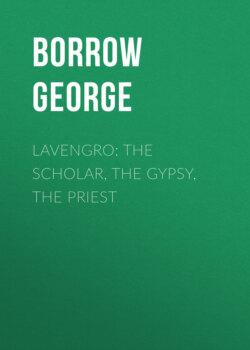Читать книгу Lavengro: The Scholar, The Gypsy, The Priest - Borrow George - Страница 14
На сайте Литреса книга снята с продажи.
ОглавлениеFine materials in that lad for a hero, you will say. Yes, indeed, for a hero, or for what he afterwards became. In other times, and under other circumstances, he might have made what is generally termed a great man, a patriot, or a conqueror. As it was, the very qualities which might then have pushed him on to fortune and renown were the cause of his ruin. The war over, he fell into evil courses; for his wild heart and ambitious spirit could not brook the sober and quiet pursuits of honest industry.
‘Can an Arabian steed submit to be a vile drudge?’ cries the fatalist. Nonsense! A man is not an irrational creature, but a reasoning being, and has something within him beyond mere brutal instinct. The greatest victory which a man can achieve is over himself, by which is meant those unruly passions which are not convenient to the time and place. David did not do this; he gave the reins to his wild heart, instead of curbing it, and became a robber, and, alas! alas! he shed blood—under peculiar circumstances, it is true, and without malice prepense—and for that blood he eventually died, and justly; for it was that of the warden of a prison from which he was escaping, and whom he slew with one blow of his stalwart arm.
Tamerlane and Haggart! Haggart and Tamerlane! Both these men were robbers, and of low birth, yet one perished on an ignoble scaffold, and the other died emperor of the world. Is this justice? The ends of the two men were widely dissimilar—yet what is the intrinsic difference between them? Very great indeed; the one acted according to his lights and his country, not so the other. Tamerlane was a heathen, and acted according to his lights; he was a robber where all around were robbers, but he became the avenger of God—God’s scourge on unjust kings, on the cruel Bajazet, who had plucked out his own brothers’ eyes; he became to a certain extent the purifier of the East, its regenerator; his equal never was before, nor has it since been seen. Here the wild heart was profitably employed, the wild strength, the teeming brain. Onward, Lame one! Onward, Tamur!—lank! Haggart. . . .
But peace to thee, poor David! why should a mortal worm be sitting in judgment over thee? The Mighty and Just One has already judged thee, and perhaps above thou hast received pardon for thy crimes, which could not be pardoned here below; and now that thy feverish existence has closed, and thy once active form become inanimate dust, thy very memory all but forgotten, I will say a few words about thee, a few words soon also to be forgotten. Thou wast the most extraordinary robber that ever lived within the belt of Britain; Scotland rang with thy exploits, and England, too, north of the Humber; strange deeds also didst thou achieve when, fleeing from justice, thou didst find thyself in the Sister Isle; busy wast thou there in town and on curragh, at fair and racecourse, and also in the solitary place. Ireland thought thee her child, for who spoke her brogue better than thyself?—she felt proud of thee, and said, ‘Sure, O’Hanlon is come again.’ What might not have been thy fate in the far west in America, whither thou hadst turned thine eye, saying, ‘I will go there, and become an honest man!’ But thou wast not to go there, David—the blood which thou hadst shed in Scotland was to be required of thee; the avenger was at hand, the avenger of blood. Seized, manacled, brought back to thy native land, condemned to die, thou wast left in thy narrow cell, and told to make the most of thy time, for it was short: and there, in thy narrow cell, and thy time so short, thou didst put the crowning stone to thy strange deeds, by that strange history of thyself, penned by thine own hand in the robber tongue. Thou mightest have been better employed, David!—but the ruling passion was strong with thee, even in the jaws of death. Thou mightest have been better employed!—but peace be with thee, I repeat, and the Almighty’s grace and pardon.
